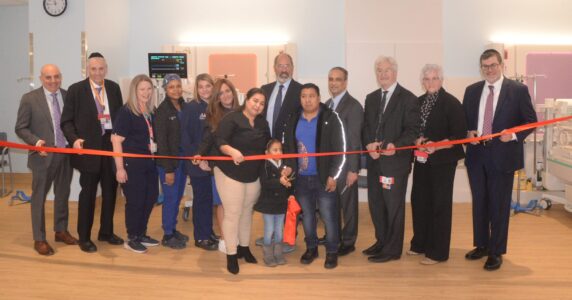Raising a flag and awareness of a deadly disease.
To mark National Breast Cancer Awareness Month, Maimonides Medical Center’s Breast Cancer Center held its annual flag-raising ceremony outside of the Eisenstadt Administration Building, 4802 10th Avenue, on Friday, October 13.
The event included Maimonides President and CEO Kenneth Gibbs and Declan Doyle, Senior VP of operations and clinical programs, as well as Chair of Surgery and Director of the Breast Center Dr. Patrick Borgen, Chief of Breast Surgery Dr. Donna-Marie Manasseh and Dr. Christina Giuliano, chief of breast imaging.
“There are two components to this (flag raising),” said Gibbs. “Part of it is education, but it’s also about our institution making a statement about its commitment to that education and also recognition of the work we all do.
“Breast cancer touches all of us,” he went on. “My mother died of breast cancer 37 years ago and I know we are all working with colleagues who are touched by it. All of us.”
Gibbs also discussed the special spirit that Maimonides brings to the fight.
“When we do new employee orientation, we use that quote from Maimonides, ‘We don’t treat the disease. We treat the person who is suffering from it.’ That notion of being committed to their lives in the context that we all live with disease around us and some of us with the disease in us,” he said. “That’s part of our special character.”
“We raise the flag to raise awareness of the disease of course,” added Doyle. “We also do it to support those affected by the disease and many people we all know and care about. We see patients and their families in waiting rooms waiting for tests, procedures or operations with anxious looks on their faces and that’s why we are doing this.”
Borgen discussed both discouraging and optimistic statistics. “In the 365 days since we did this last year, 245,000 American women received a diagnosis of breast cancer,” he said adding that since the last event, 41,000 women have died of breast cancer and 1.1 million American women had abnormal mammograms and needed an invasive procedure and a biopsy.
“The good news is the survivorship of breast cancer has improved by more than two to three percent per year in the last 20 years,” he said. “More women are beating this disease today than ever before and the U.S.A. has the highest survival rate for breast cancer on earth. That’s because women fought for their cause, argued for more funding.”
According to Borgen, over the last year, Maimonides Breast Center performed over 20,000 mammograms and treated over 700 women with primary breast cancer.
Manasseh also had a take on the meaning of the flag. “We raise it for awareness and hope. In early detection, there are things we can do,” she said, sharing stories of patients treated at the hospital who benefited from the increased awareness.
One woman, age 25, learned that some of her family members had breast cancer and was tested for the gene, Manasseh recounted. “She found out she was positive for the gene and had very early cancer, and was cured. Without that awareness, she would have found that terrible mass years later at a point where she might have succumbed to the disease.”
The facility’s state-of-the-art equipment also was discussed. In particular, Giuliano described the 3D stereotactic biopsy table now used at the hospital, which, she said, was “The first and only [hospital] in Brooklyn and the first in all of New York to have [one].
“You lay on the table,” she explained. “If an abnormality was found on the mammogram, we can get to it with a needle so you don’t need surgery to take it out very precisely.”















 Maimonides expands its Neonatal Intensive Care Unit
Maimonides expands its Neonatal Intensive Care Unit  May her memory be a blessing
May her memory be a blessing